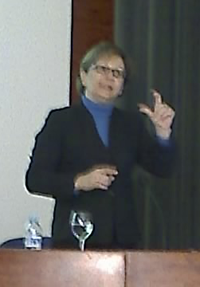Conference by Martha Cleveland-Innes, from Athabasca University, at UOC headquarters.
Martha Cleveland-Innes: Disciplinary differences and the impact on online design and delivery

Martha Cleveland-Innes
Different disciplines have different approaches on e.g. what quality is. And there is little research assessing what are the points of view of such disciplines concerning digital learning. So, there is a need to investigate the disciplinary effects on quality definitions, what are the quality factors, etc. Can we draw a common online quality matrix?
The practitioners’ point if view is that we have to focus on the student and his learning experience. On the other hand, while there doesn’t seem to be a unique use for a specific technology, evidence shows that peer-to-peer working enhances collaboration, sharing and a better output in educational terms.
How are disciplinary differences affecting online learning?
Disciplines were sorted in two axes: hard vs. soft, pure vs. applied
- Hard-pure: pure sciences. Knowledge is cumulative, atomistic, concerned with universals, quantities, simplification; driven by observations, discovery of new facts… e.g. Physics.
- Soft-pure: humanities. More reiterative, holistic, concerned with particulars, qualities. Critical thinking, apply theories, experiential, personal constructions of knowledge… e.g. History
- Hard-applied: technologies. Pragmatic. Field is unique, and must be treated as such, interdisciplinary but required skill standards… e.g. Engineering
- Soft-applied: applied social science. Functional, utilitarian. Theory into practice, mastery of applied knowledge… e.g. Education
The essential pedagogy of… and their pedagogical model
- Hard-pure: content focus and text-based. Well-written presentations and hands-on labs
- Soft-pure: critical thinking and reading, logic, argumentation, discussion. Dialogue, deep learning, constructivism
- Hard-applied: collaborative yet objective and exact. Multi-modal, simulations interactive, case based
- Soft-applied: collaborative skill development. Experiential, problem based
The debate began here and was richest. It dealt with how to design different methodologies according to different disciplines, whether “one-size-fits-all” is a good idea, or it might work well as a starting point that need evolve in the future, etc.
Professor Lourdes Guàrdia correctly points that sometimes this “starting point” is designed from an economic sustainability point of view, more than from pedagogy, so faculty can do little to have their voices herd during this first phase to build a model and make it sustainable.
Video of the presentation:
If you need to cite this article in a formal way (i.e. for bibliographical purposes) I dare suggest:
Peña-López, I. (2008) “Martha Cleveland-Innes: Faculty views on disciplinary differences in online higher education” In ICTlogy,
#52, January 2008. Barcelona: ICTlogy.
Retrieved month dd, yyyy from
https://ictlogy.net/review/?p=681
Previous post: The scarcely relevant practice of chat rooms and social networking sites
 RSS feed for comments on this post.
TrackBack URI
RSS feed for comments on this post.
TrackBack URI

